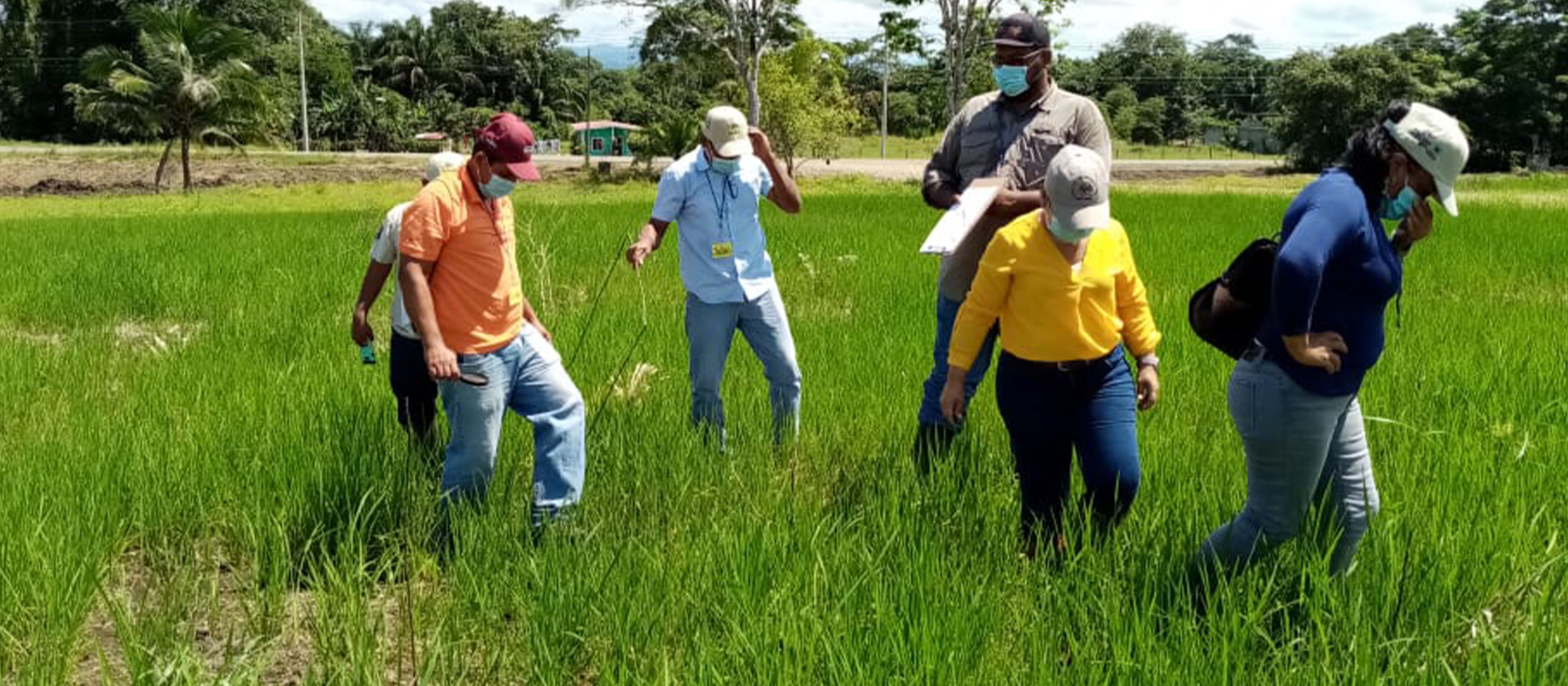Successful completion of the project "Support to the Formulation of Appropriate Mitigation Actions in Central American Agriculture", financed by the EUROCLIMA+ programme of the European Union (EU) in the Resilient Food Production sector.
The project, which had a total amount of €1,126,000 (EU grant €874,994), has been focused on strengthening national and regional capacities to achieve public-private ownership and consensus in reaching mitigation targets in Panama (rice) and El Salvador (cattle), catalysing mitigation actions and cooperation between Central American countries.
Video of the project
IICA, the project executing institution, together with the Ministry of Agricultural Development of Panama as the co-executing institution, and the political counterparts, the government of El Salvador and the Central American Agricultural Centre, played a strategic role and joined forces for the technical implementation of the project, as well as the promotion of a more sustainable, resilient and low-carbon agriculture, key for the future of the planet and to ensure food security, as well as the mitigation of the effects of climate change.
It is worth noting that the number of beneficiaries in the framework of the implementation of the project exceeds 1500 people (10% women), including the extension of awareness-raising to more than 700 people related to livestock and 300 professionals and producers in the SICA region. In this way, more than 50 professionals from the public and private sector were able to strengthen their technical capacities in the implementation of practices for Sustainable and Climate Adapted Agriculture (ASAC) in rice and low Greenhouse Gas Emissions (GHG) livestock.
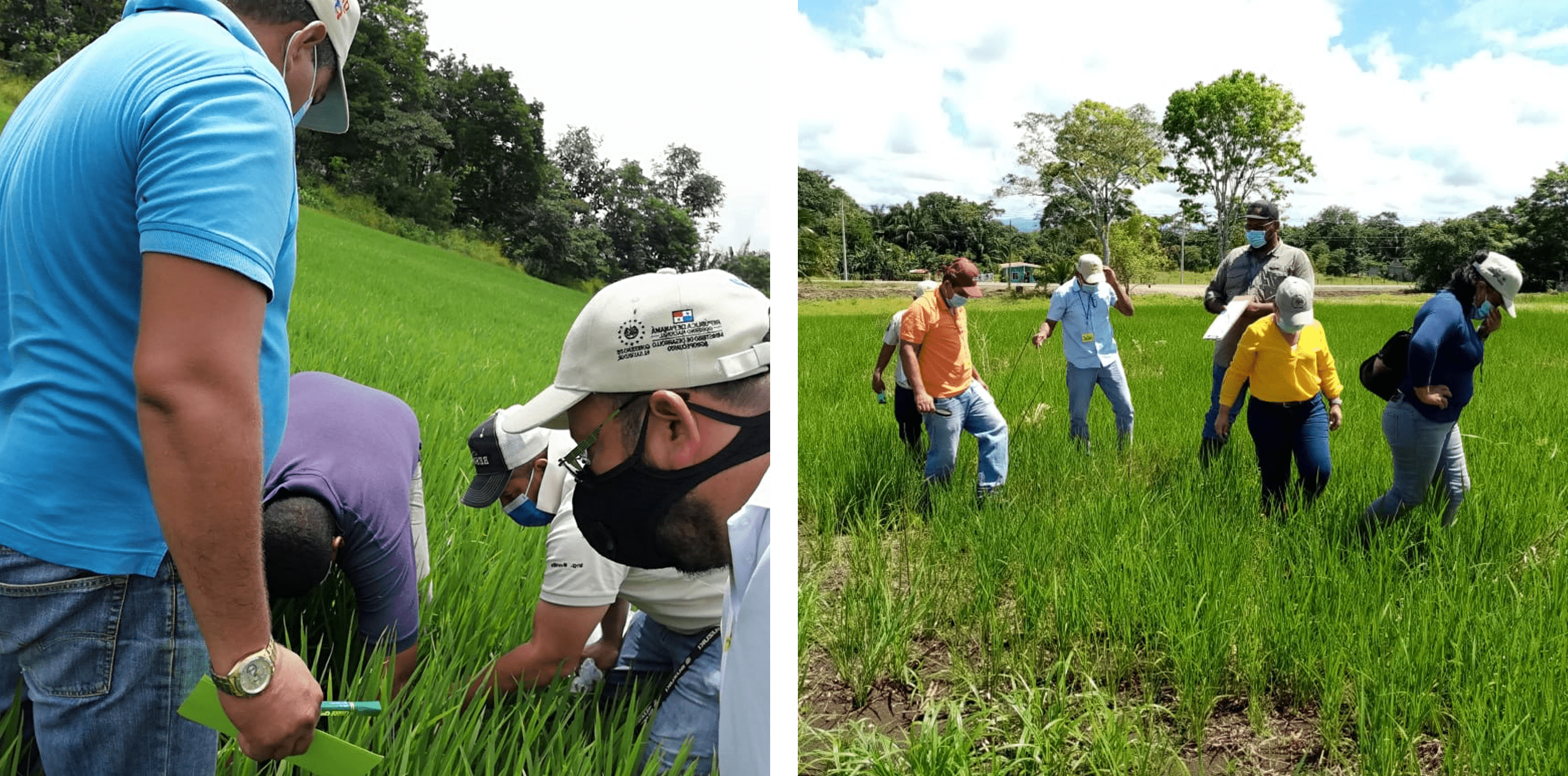 |
Plant density measurement, and Pest monitoring
This technical strengthening achieved awareness-raising on the impacts and benefits of Nationally Appropriate Mitigation Actions (NAMAs); the Monitoring, Reporting and Verification System (MRV); Registration of indicators and key factors that affect the different sectors in the quantification of GHGs and the calculations of emissions from the NAMA for low greenhouse gas (GHG) rice in Panama and for the livestock sector in El Salvador.
Using the learning-by-doing methodology, more than 217 of Field School (ECA) sessions were developed on curriculum issues for the development of Nationally Appropriate Mitigation Actions (NAMAs) for rice in Panama in the provinces of Chiriquí, Veraguas, Coclé, Los Santos and Darién; and livestock in El Salvador in Chalatenango and Morazán.
The results of these schools include, among others, an increase in rice production in Panama thanks to the follow-up of a Climate Adapted Dryland Rice Production System (PASAC) proposed by the project in the ECAs of Trinchera in Panama. ECAs were also launched at the La Joya Penitentiary Centre, where inmates learned new rice cultivation techniques as part of their re-socialisation programme.
Notably, in Panama, the rice NAMA was developed and submitted for registration with the NAMA Facility as part of Panama's Nationally Determined Contributions (NDCs) to greenhouse gas (GHG) reduction. In El Salvador, meanwhile, the livestock NAMA roadmap was developed and submitted as part of the country's increased ambitions in its NDCs, for subsequent continuation and registration with the NAMA Facility.
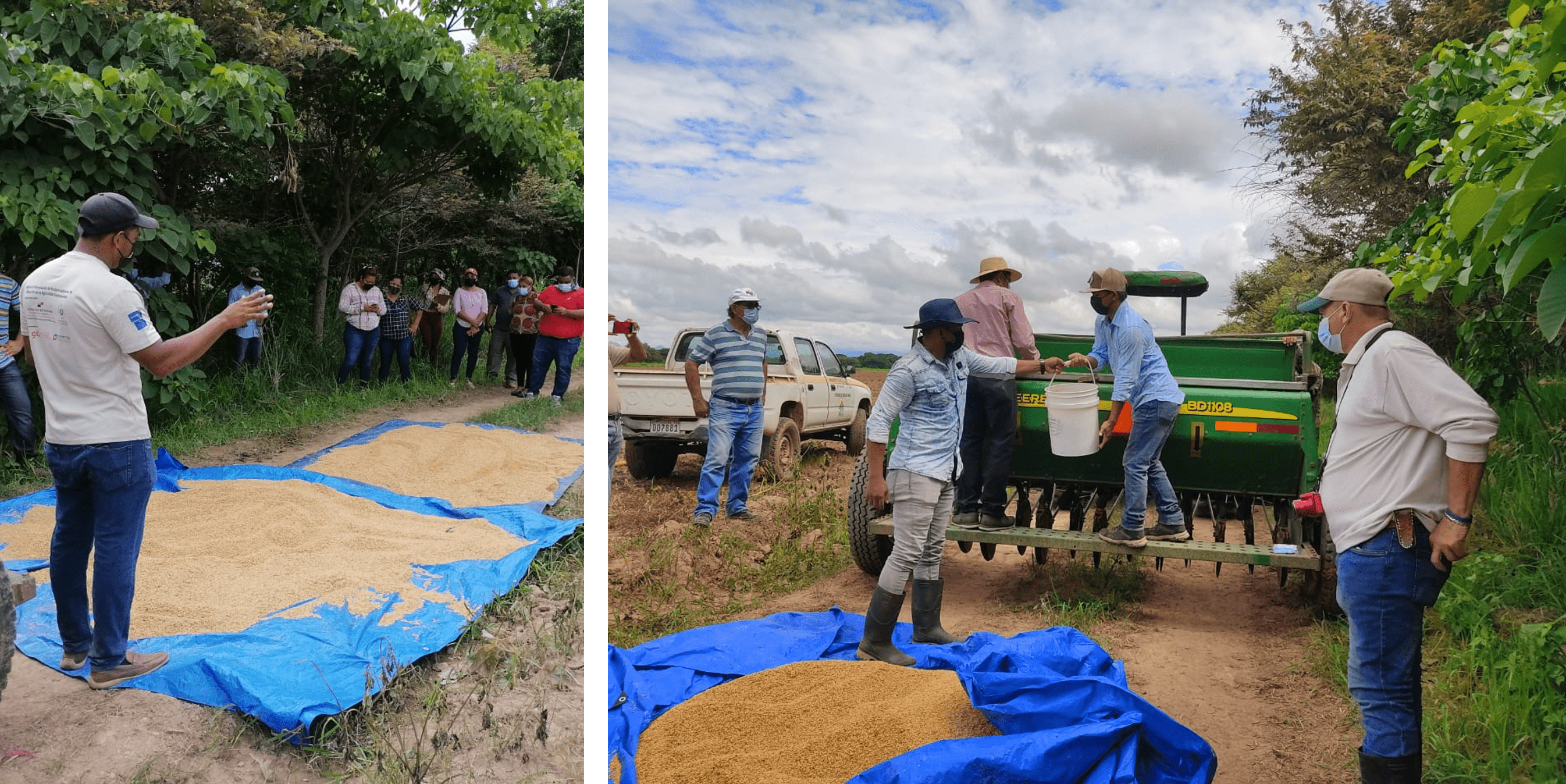 |
First session
Testimonies
Marcelo Ayala, cattle farmer of El Salvador
"We have gained knowledge with the ECAs, with the orientations that the technicians gave us, this has allowed us to have more knowledge, because we have to improve the quality of the pasture and our cattle; we have learned to prepare the cattle's food in a different way. And doing it together, not just in theory.
In March 2020, the ECAs were started in El Salvador with 137 livestock farmers. One of the most interesting topics was the use of probiotics in cattle diets, as the cattle reacted after 3 to 4 days and produced more milk, which indicates that the project's techniques do work. The farmers learned how to grow improved hybrid grasses, such as the camello variety, which is adapted to low humidity soils. The producers learned other techniques such as: assessing the optimum point at which the grass is ready to deliver the most nutrients, as well as how long to wait before allowing the cattle to graze. These techniques helped to improve milk production. Ten production model farms were developed."
Manuel Pitre, IICA Technology and Innovation Specialist and Project Focal Point
With the implementation of the project "Support to the Formulation of Appropriate Mitigation Actions in Central American Agriculture", the ECAs were able to develop topics for livestock production such as: the use of living fences, fodder banks, manga plots for better rotation of livestock, and improved fertilisation. In rice, using the same ECA methodology, several topics were developed for resilient production, such as: soil analysis, adequate fertilisation, certified seeds, row planting of rice, and pest monitoring.
We have achieved the expected objectives by making farmers in both countries aware of cleaner production from an environmental point of view with these practices. Producers can improve their production costs by reducing the resources they use on their farm with conventional planting, which will allow for the reduction of greenhouse gas emissions using environmentally friendly techniques”.
Gladys Godoy, Producer in Veraguas province, Republic of Panama
“With the project we learned to identify the pests, weeds and diseases that affect rice cultivation, and we learned to apply appropriate products on them, avoiding the use of agrochemicals that damage the environment.”
Javier Montemayor, Regional Coordinator of the Project
“The project has not only contributed to the NDCs of each country, it has also achieved that several actors (public-private) from the rice sector in Panama and the livestock sector in El Salvador interact for a common good, seeking the profitability of their activities with an awareness of general welfare, helping to mitigate greenhouse gas emissions and learning to produce by adapting to climate change".
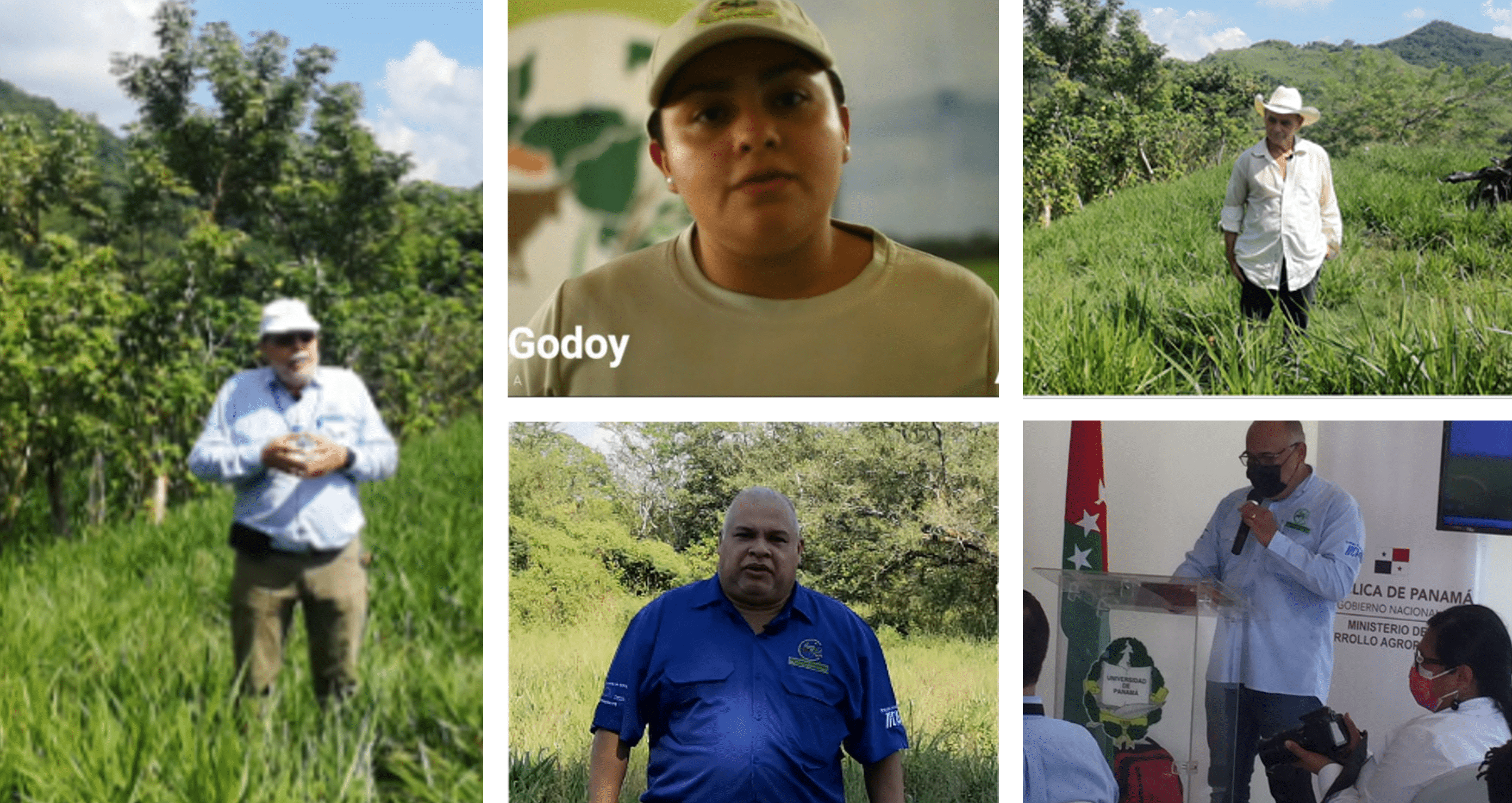 |
Marcelo Ayala, Gladys Godoy, Manuel Pitre, Javier Montemayor.
Results, achievements and successes
Preparation of booklets
Strengthened technical capacities in the implementation of sustainable and climate-adapted agricultural practices (ASAC), for which two ECA guide booklets have been developed in Panama, one on rainfed rice production systems (PASAC) and the other on irrigated rice production systems (PARSAC). In addition, a low carbon livestock ECA guide booklet has been developed in El Salvador.
Field schools
Developed more than 105 field school sessions (ECAs) in Panama and 112 ECA sessions on topics of the curriculum for the development of a NAMA in rice and livestock.
Socialisation of results
Preparation and presentation of the characterisation of the rice sector in Panama and the livestock sector in El Salvador. In addition, benchmarking of NAMA development cases in rice with an emphasis on Latin America (Costa Rica, Panama, Colombia, etc.) were presented.
ECA for the inmates in La Joya
Developed and implemented an ECA for rice in the penitentiary system for the training of inmates interested in learning low-carbon rice production, complementing the re-socialisation programme for inmates.
Trained young people
Formation of groups of young people (generational change) specialising in pest monitoring.
Incentives in seeds
234 cattle ranchers participating in the ECAs in El Salvador were benefited with incentives in improved grass seeds, seeds of cut grasses and protein source seeds for the development of their farms. In addition, two pilot farms were set up and implemented, one in Morazan and the other in Chalatenango.
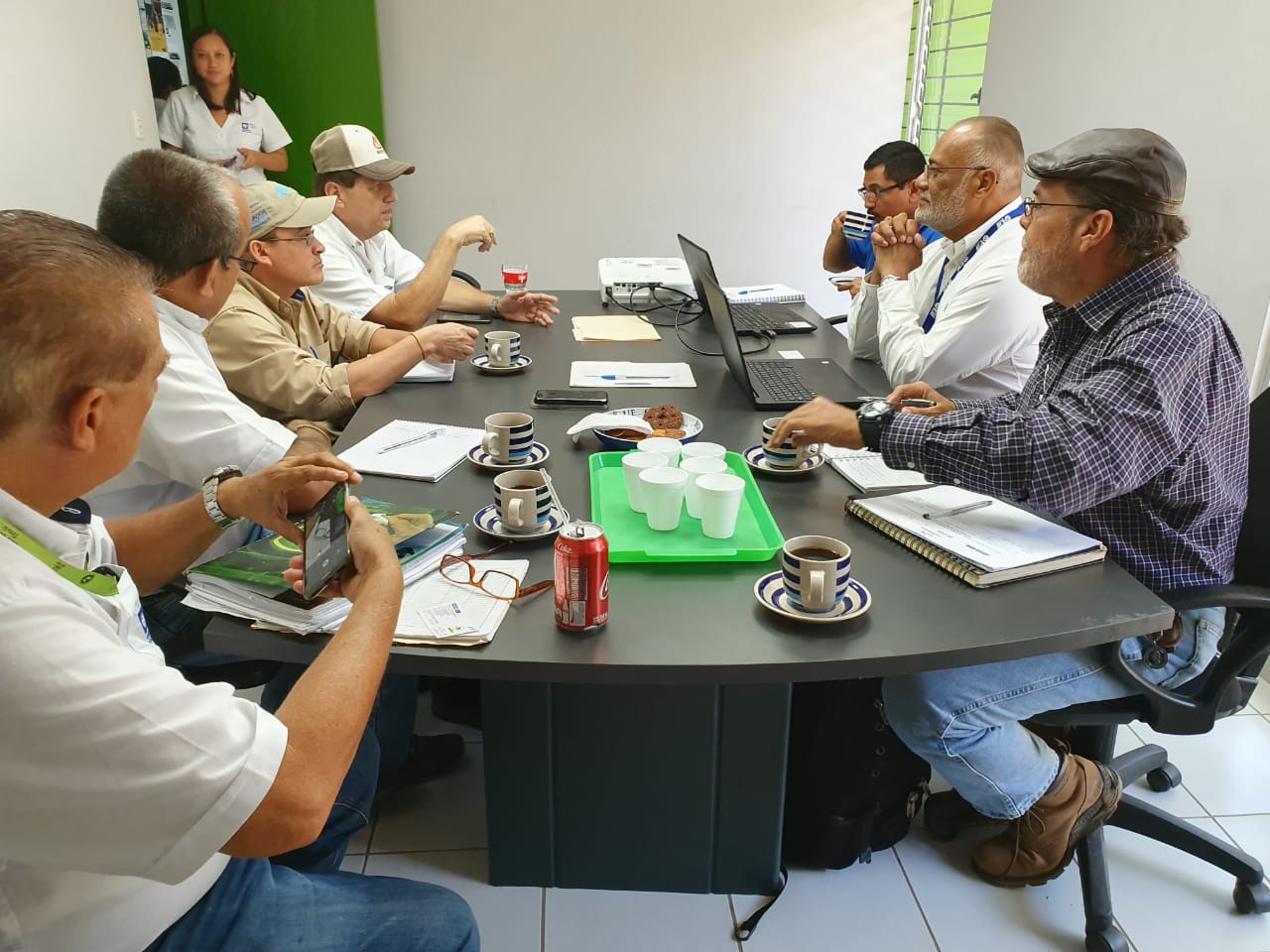 |
Working meeting of the project team
Estimation of GHG
Estimated GHG emissions in the rice sector in Panama and livestock in El Salvador, as well as the mitigation potential of a set of appropriate measures, through a useful methodology that is replicable over time.
Awareness-raising workshops
Technicians were made aware of the impacts and benefits of the NAMA and the protocol for monitoring, reporting and verification (MRV) and the emissions of the low GHG rice NAMA in Panama and for the livestock sector in El Salvador. Through workshops, the concepts for identifying mitigation and/or adaptation measures were presented. The methodology for calculating GHG and recording indicators and key factors that affect the different sectors in the quantification of GHG were presented. The platform for recording and calculating emissions was also presented to the participants.
Training of officials
Promoted and raised awareness on the relevance and impact of the use of the MRV protocol by technical professionals from related ministries and professionals in the area and related to the Project.
Replicated knowledge
72 officials and technicians in Panama and 69 officials and technicians in El Salvador fulfilled the purpose of disseminating the MRV methodology and how it is constructed and applied; awareness was raised about the impacts and benefits of the NAMA and the MRV protocol and the calculations of emissions from the low-GHG rice NAMA in Panama and for the livestock sector in El Salvador.
Gender
Three gender workshops held in Panama for the rice sector in three different areas of the country: Chiriqui, Vergaguas and Darien.
Rice NAMA presented, Panama
Preparation and submission of the rice NAMA in Panama for registration with the NAMA facility as part of Panama's NDC on GHG reductions.
Road map for the livestock NAMA, El Salvador
Preparation and submission of the roadmap for the livestock NAMA in El Salvador as part of the country's increased ambitions in the NDC, for its continuation and preparation of the livestock NAMA for its registration with the NAMA facility.
About the project
The project "Support to the Formulation of Appropriate Mitigation Actions in Central American Agriculture" has been developed over 30 months in El Salvador and Panama, with the objective of promoting nationally appropriate mitigation measures in the livestock and rice sectors, respectively in El Salvador and Panama, through three goals:
- Strengthen capacities and provide technical assistance to 500 rice or livestock producers and their associations to implement Sustainable and Climate Adapted Agriculture (ASAC) practices.
- Public-private ownership and consensus to formulate mitigation actions and ASAC with the participation of 50 public-private sector professionals.
- Catalyse South-South exchanges and cooperation with the participation of 50 representatives of institutions and 5 Central American countries.
The project "Support to the Formulation of Appropriate Mitigation Actions in Central American Agriculture" developed the EUROCLIMA+ Green Solutions "Producers in El Salvador and Panama practice relevant actions to mitigate GHG in rice and cattle farming and adapt to change" (see the infographic) and "Public institutions in Panama strengthen their capacities to implement the National Climate Change Plan in the agricultural sector" (see the infographic).
More Information
This email address is being protected from spambots. You need JavaScript enabled to view it.
This email address is being protected from spambots. You need JavaScript enabled to view it.

